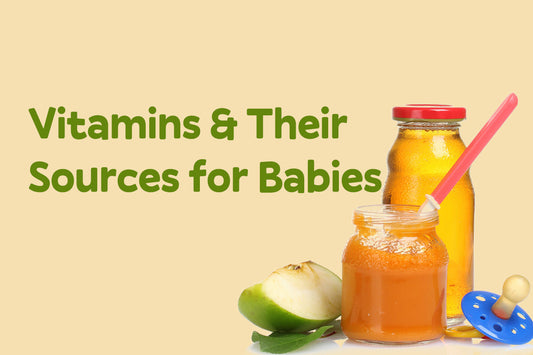Vitamins and Their Sources for Babies
Top Vitamins Their Sources for Babies: A Simple Guide for Parents
Ensuring your baby gets the right vitamins is essential for healthy growth and development. Vitamins play a crucial role in building strong bones, boosting the immune system, and helping babies thrive. Here’s a breakdown of the most important vitamins for babies and where you can find them.
1. Vitamin D: The Sunshine Vitamin
Vitamin D is essential for the development of strong bones and teeth as it helps the body absorb calcium and phosphorus. Since babies often don’t get enough sun exposure, especially indoors or covered, a Vitamin D supplement is usually needed in the first year of life.
- Recommended Daily Intake:
- 0–12 months: 400 IU (10 mcg)
- 1–18 years: 600 IU (15 mcg)
- Sources of Vitamin D:
- Sunlight: Just 15 minutes of sunlight twice or thrice a week (between 10 AM and 2 PM) can help your baby’s body produce enough vitamin D.
- Whole Eggs: The yolk from one large egg contains about 37 IU of vitamin D.
- Fatty Fish: Fish like salmon, mackerel, and sardines are packed with vitamin D. For example, 100 grams of mackerel provides 643 IU of vitamin D.
- Mushrooms: Some mushrooms produce vitamin D2 when exposed to sunlight. One cup of UV-exposed mushrooms contains 1,110 IU of vitamin D.
- Fortified Milk: Some cow’s milk is fortified with vitamin D. One cup can provide up to 115 IU.
Tip: Always check labels for fortified foods like milk, cereals, and juices, as they may or may not have added vitamin D.
2. Vitamin A: For Good Eyesight and Immunity
Vitamin A is vital for good vision, healthy skin, and a strong immune system. Babies need foods rich in beta-carotene, which the body converts into vitamin A.
- Recommended Daily Intake:
- 0–6 months: 400 mcg
- 7–24 months: 500 mcg
- 1–3 years: 300 mcg
- Sources of Vitamin A:
- Liver: Though not common in Indian households, beef liver is one of the richest sources of vitamin A, with 6,582 mcg in just 3 ounces.
- Sweet Potatoes: A common vegetable in Indian homes, one baked sweet potato has 1,403 mcg of vitamin A.
- Spinach: Half a cup of boiled spinach contains 573 mcg of vitamin A.
- Egg Yolks: Chicken egg yolks contain about 1 mg of vitamin A per 100 mg.
- Carrots: A favorite veggie for many babies, carrots are a great source of beta-carotene, which converts to vitamin A in the body.
3. Vitamin C: Immunity Booster
Vitamin C is essential for tissue repair, healing wounds, and supporting a healthy immune system. It is commonly found in fruits and vegetables, and luckily, many Indian fruits are rich in this vitamin.
- Recommended Daily Intake:
- 7–12 months: 50 mg
- 1–3 years: 15 mg
- 4–8 years: 25 mg
- Sources of Vitamin C:
- Oranges: One medium orange provides about 70 mg of vitamin C.
- Kiwi: One kiwi contains around 64 mg.
- Bell Peppers: Red bell peppers, commonly found in salads or stir-fries, provide 191 mg in just one cup.
- Strawberries: One cup of strawberries provides 49 mg of vitamin C.
- Cauliflower: A commonly available vegetable in Indian markets, one cup of cauliflower provides 40 mg.
4. Vitamin E: The Antioxidant
Vitamin E helps protect the cells from damage and supports the immune system. Babies can get vitamin E from breast milk, formula, and solid foods as they grow.
- Recommended Daily Intake:
- 1–3 years: 6 mg
- 4–8 years: 7 mg
- Sources of Vitamin E:
- Vegetable Oils: Oils like sunflower, safflower, and soybean oil are great sources of vitamin E.
- Nuts and Seeds: Almonds, peanuts, and sunflower seeds are packed with this vitamin. However, be cautious with whole nuts for babies—crush or blend them to avoid choking hazards.
- Egg Yolks: Another easy source of vitamin E.
- Green Leafy Vegetables: Spinach and broccoli are rich in vitamin E, adding another reason to include these in your baby’s meals.
5. Vitamin K: For Healthy Blood and Bones
Vitamin K is crucial for blood clotting and bone health. Babies are often given a vitamin K shot at birth to prevent deficiency, but as they grow, they can get this vitamin from certain foods.
- Recommended Daily Intake:
- 1–3 years: 30 mcg
- 4–8 years: 55 mcg
- Sources of Vitamin K:
- Spinach: Half a cup of spinach has a whopping 469 mcg of vitamin K.
- Broccoli: Another great vegetable, broccoli contains 116 mcg in half a cup.
- Kiwi: This fruit not only contains vitamin C but also provides 28 mcg of vitamin K.
- Soybeans: These are a good source, providing 24 mcg per ¾ cup.
- Avocados and Blueberries: Both are great finger foods for babies and provide around 22–28 mcg of vitamin K.
Tip: Even small amounts of vitamin K-rich foods, like avocados or green veggies, can add up and meet your baby’s daily needs.
Conclusion:
As your baby grows, ensuring they receive these key vitamins through a balanced diet is important. Breast milk and formula provide some vitamins, but as babies start solids, introducing a variety of fruits, vegetables, and other foods will help them get the nutrients they need. Always consult with a pediatrician before making any significant changes to your baby’s diet, and ensure they’re getting the right supplements, if necessary.





